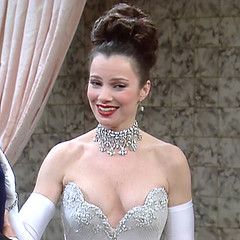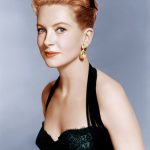Few performers have ever turned a voice — a laugh, a personality — into a cultural phenomenon the way Fran Drescher did. Born on September 30, 1957, in Queens, New York, she transformed her unmistakable accent and quick wit into a career that spanned decades, from sitcom royalty to labor leadership. From
The Nanny to SAG-AFTRA, Drescher’s story is one of resilience, reinvention, and a refusal to be underestimated.
Francine Joy Drescher grew up in a working-class Jewish family in Flushing, Queens — a neighborhood that would later shape her most famous character. Her father, Morty, was a systems analyst; her mother, Sylvia, a bridal consultant. From a young age, Fran had a knack for making people laugh. Teachers noticed her dramatic flair, and classmates remembered her distinctive, nasally voice — something that would one day become her signature.
She studied cosmetology in high school, where she met Peter Marc Jacobson, who would later become her husband, creative partner, and co-creator of her most successful series. Together, they dreamed of making it in entertainment.
After finishing school, Drescher began auditioning for small film and TV parts in New York. Her screen debut came in the John Travolta–starring Saturday Night Fever (1977), where she had just one memorable line — but that voice made sure audiences noticed her. Hollywood had met Fran Drescher.

Through the 1980s, Drescher built a reputation as a scene-stealer, often cast as the sharp-tongued, stylish New Yorker. She appeared in comedies such as The Hollywood Knights (1980), Doctor Detroit
(1983), and Rob Reiner’s cult classic This Is Spinal Tap (1984), where she played Bobbi Flekman — a no-nonsense record company publicist whose sass could go toe-to-toe with any rock star. Her comedic rhythm, part vaudeville and part Queens street smarts, set her apart from the Hollywood mold. But beneath the humor was determination. “If you’re from Queens, you learn early to work twice as hard and talk twice as loud,” she once said in an interview.
It wasn’t until the 1990s that Fran Drescher became a household name — thanks to a flash of inspiration on an airplane. On a flight to London, she ran into CBS executive Jeff Sagansky. By the time they landed, she had pitched him a show idea: a working-class Queens girl who becomes a nanny for an uptight British family.
The Nanny premiered in 1993 — and television was never quite the same.

As Fran Fine, the flashy, big-hearted nanny with skyscraper hair, designer clothes, and an accent thicker than cream cheese, Drescher created an instant icon. Viewers fell in love with her warmth, confidence, and impeccable comedic timing. The series ran for six seasons, earning Emmy nominations, Golden Globe nods, and an enduring place in pop culture.
Behind the scenes, Drescher co-created, wrote, and produced the show with Jacobson. It was a labor of love and a reflection of her real life — her Queens upbringing, her mother’s mannerisms, and her own climb through Hollywood’s ranks.
The Nanny wasn’t just funny — it was empowering. A brash, working-class woman wasn’t the punchline; she was the hero.

In 2000, Drescher’s life took a dramatic turn when she was diagnosed with uterine cancer. It took two years before doctors found the cause of her symptoms, but after successful treatment, she became a passionate advocate for health awareness. She founded the nonprofit organization
Cancer Schmancer Movement, aimed at promoting early detection and prevention. Her openness about her experience gave strength to millions facing similar battles.
Her activism didn’t stop there. Drescher has long used her platform to champion women’s rights, LGBTQ+ equality, and healthcare reform. In interviews, she’s spoken about transforming trauma into purpose — a philosophy that has defined her both on and off screen.

In 2021, Fran Drescher took on a very different kind of stage: the political and labor arena. Elected president of SAG-AFTRA, the powerful union representing more than 160,000 actors, broadcasters, and performers, she became one of the most visible labor leaders in entertainment.
Then, in 2023, history called again. During the Hollywood strikes over fair pay and protections against AI use, Drescher emerged as the face — and voice — of the movement.
Her fiery speeches went viral across social media. Standing before cameras and crowds of striking actors, she thundered:
“The eyes of the world are upon us. What happens here is important because what’s happening to us is happening across all fields of labor.”

That voice — once used for comedy — now carried the weight of history. She was praised for her resolve, compassion, and eloquence. Critics called her “the unexpected powerhouse,” while supporters hailed her as the labor icon the industry needed. Under her leadership, SAG-AFTRA secured groundbreaking gains for performers — proving once again that Drescher’s greatest strength has always been her authenticity.
Even outside of activism, Drescher has continued to captivate audiences. She lent her unmistakable voice to the animated Hotel Transylvania film series (as Eunice, the wife of Frankenstein), appeared in Broadway productions, and reunited with former castmates for nostalgic
Nanny specials.
Through it all, that laugh — bright, loud, unapologetically hers — remains her calling card. It’s a sound that says survival, joy, and defiance.

From Bobbi Flekman’s backstage sass to Fran Fine’s rhinestone-clad resilience, to the union president rallying thousands of workers — Fran Drescher has lived a life as big and bold as her voice. She turned her uniqueness into power, her hardships into advocacy, and her humor into history.
As one critic once wrote:
“You can imitate her laugh, her walk, her voice — but you can’t imitate her courage.”
Today, Fran Drescher stands not just as a star of the small screen, but as proof that being different — being loud, being you — can change the world.


